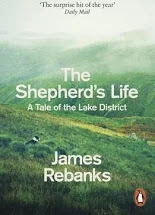
I have never read a book so dripping with privilege. I read it weeks ago and it still makes me feel cross every time I think about it.
It started off on a bad note, in the Introduction, where he tells us:
If we want to understand the people in the foothills of Afghanistan, we may need to try and understand the people in the foothills of England first
That ‘we’ made me mad – the implicit assumption that everyone reading this book has the same frame of reference and must be British.
And mentioning Afghanistan is a particularly bad move. The book is about his life as a shepherd in the Lake District. He struggles to make ends meet, because sheep farming in that context is fundamentally not economically feasible. Whereas other people when they are in situations where their preferred life is now longer economically feasible (e.g., in Afghanistan because of conflict, or in Chad because the Lake is disappearing due to climate change) then those people just have to SUCK IT UP and do something else. In his case, however, the Lake District has been heavily funded by the Government and by independent philanthropists who have chosen to fund non-urgent needs, he is able to carry on with his preferred lifestyle. And not only does he get to carry on, but he feels free to moan about it too. For example, he appears to disdain tourists Here he is on his grandfather, who he typically agree with:
I don’t think he understood that those people had another perception of ownership of the Lake District. He would have found that as odd as him walking into a suburban garden in London and claiming it was sort of his because he liked the flowers
Tourists don’t claim to own the Lake District because they like the flowers but because IT IS THEIR TAX DOLLARS THAT ALLOW IT TO EXIST. Even worse, here he is on such unimportant matters as the environment:
I can remember officials from ‘the Ministry’ (of Agriculture) coming to talk to him about the ‘biodiversity’ in our hay meadows and what they expected him to do to manage those meadows for the flowers and birds in return for the subsidy they paid. After an hour and a half of observing him nodding and agreeing to everything they suggested, they departed, and I asked him what they wanted. He said, ‘No idea . . . The secret with them daft buggers is to say yes to everything they want, and when they’ve gone carry on regardless’
